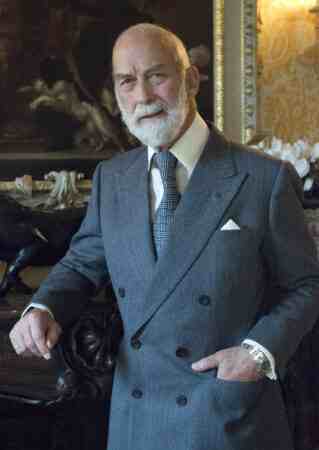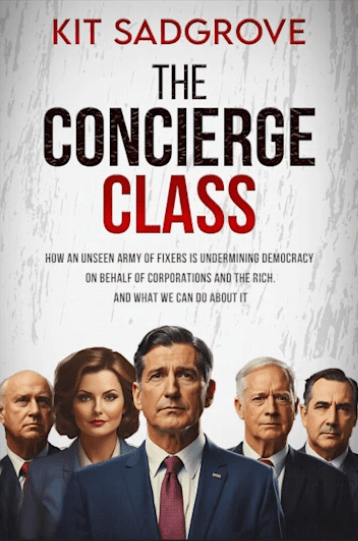It’s not just the rich. The aristocracy has an effect, too.
 I was at a trade conference when Prince Michael walked past, attended by numerous guides.
I was at a trade conference when Prince Michael walked past, attended by numerous guides.
He’s a minor royal, a cousin of King Charles III, and celebrated in Russia for his resemblance to Czar Nicholas II, who was his grandmother’s cousin.
There was an aura surrounding Prince Michael, a stillness in the air. Everyone hung on his words, as he shook hands affably with suit-wearing people who were promoting IT equipment.
Even I couldn’t help but feel in awe at being in the presence of royalty. This was a man whose relatives were kings and queens.
Slowly the retinue moved on, and the atmosphere returned to normal.
And that’s the effect that royalty has. We can sneer at individual politicians, or even regard them with contempt; but the royal family is different. They stand for all the qualities of Britain and its heroic past. Or that’s how it feels.
The truth is somewhat different. The House of Windsor was only founded in 1917, from the family name of House of Saxe-Coburg and Gotha, which was deemed rather too German during WWI.
Prior to that, the line only dates back to 1714, when a minor German princeling, Georg Ludwig became king of Great Britain, due entirely to the deaths of others who had a higher claim to the throne.
To put it another way, even I can trace my British and Irish ancestry further back than that.
But I can’t become king, because that role is limited to whoever is most closely related to the current king or queen.
It’s a throw-back to the era when kings were ‘real’ rulers, appointed by God (as they claimed), but were really just the toughest, meanest, most ambitious robber baron in the land.
Many people perceive royalty’s role as purely ceremonial. But that’s part of their disguise. it’s a lot more than that. It’s about the power and money they possess, and what effect it has on people.
The royal family plays a major part in maintaining the rest of us in subliminal subservience. The king is at the top of a pyramid of nobility that extends down through barons, earls and viscounts; and then down to knights; before the line descends to the serfs, villeins and labourers (that’s us).
7 Reasons monarchy is bad for us
1. Undemocratic and inequitable: The monarchy is an undemocratic institution, as the head of state is not elected by the people but is instead determined by birthright. In a democratic society, the head of state should be elected by the people and subject to the same laws as everyone else. You wouldn’t hire someone to fly a plane just because her father had been a pilot.
This hereditary system goes against the principles of democracy, where all citizens are equal and have a say in who governs them. In Ireland many many other countries, they elect poets and philosophers.
2. Costly and wasteful: The monarchy is a costly institution, funded by taxpayers (though it isn’t anywhere as wealthy as the very rich). The Sovereign Grant, which provides public funding for the monarchy, totalled £86.3 million in 2022-23. This money could be better spent on other public services, such as healthcare or education.
3. Symbol of inequality and privilege: The monarchy represents a system of inherited wealth and privilege that perpetuates inequality in society. The royal family enjoys a lavish lifestyle and special privileges, while many citizens struggle to make ends meet.
4. History of scandals and controversy: The royal family has been involved in numerous scandals and controversies over the years, which have damaged its reputation and eroded public support.
From Prince Harry wearing a Nazi armband, apparently at a fancy dress party, to Virginia Giuffre filing a lawsuit against Prince Andrew accusing him of sexual assault on Jeffrey Epstein’s private island when she was 17, there’s no shortage of scandals.
5. Lack of transparency and accountability: The monarchy is a secretive institution, and there is a lack of transparency and accountability regarding its finances and activities. The king has reportedly been claiming and profiting for years off assets known as “bona vacantia,” which are owned by people who died without a will or known next of kin, in order to upgrade his commercial properties for rent (https://nypost.com/2023/11/25/news/king-charles-secretly-profits-off-assets-of-dead-brits-report/).
6. Potential for abuse of power: While the monarch’s powers are largely ceremonial, there is still the potential for abuse of power. A monarch could use their position to influence political decisions or undermine democracy. We know, for example, that Elizabeth II successfully lobbied the British government to change a draft law in order to conceal her “embarrassing” private wealth from the public (https://www.theguardian.com/uk-news/2021/feb/07/revealed-queen-lobbied-for-change-in-law-to-hide-her-private-wealth).
7. Symbol of colonialism and imperialism: The monarchy is a reminder of Britain’s colonial past, which has caused great suffering and injustice around the world. Abolishing the monarchy would be a symbolic step towards acknowledging and addressing these harms.
The House of Lords
And before we forget, there’s the House of Lords, an unelected upper house. You can’t get into it unless your mum or dad is one of the 92 hereditary peers, or the prime minister appoints you – usually because you’ve paid their political party enough money.
The House of Commons
The elected House of Commons has changed little since the 18th century. The MPs address each other as The House of Commons doesn’t help the cause, with use of titles such as ‘The Right Honourable Gentleman’ (https://www.thehumanfront.com/to-use-a-personal-title-is-to-accept-inequality-part-iii-the-ruling-upper-class/), and parliament is opened by the monarch being driven in a gold horse-drawn carriage and amid much bowing and scraping. It serves to intimidate and to assert elitism. And unlike modern parliaments, the MPs face each other as in combat, rather than a semi-circle that emphasises collegiality and compromise.
Aristocracy
And then there’s the rest of the aristocracy. Just 36,000 people, or 0.6% of the population, own more than half of the rural land in England and Wales, most of which has been in their family for centuries (https://socialistworker.co.uk/background-check/who-owns-britain-how-the-rich-kept-hold-of-land/).
In short, the monarchy and the aristocracy breed deference, and the wealth they own serves to perpetuate their continued existence. It does so by extracting rent from the land and property they own, supported by trusts that let them escape paying tax and preventing redistribution. As a result, there’s little social mobility.
“The UK has one of the poorest rates of social mobility in the developed world,” says Deloitte, not known for its socialist values, “This means that people born into low-income families, regardless of their talent, or their hard work, do not have the same access to opportunities as those born into more privileged circumstances (https://www2.deloitte.com/uk/en/pages/about-deloitte-uk/articles/social-mobility.htm),” it says.
How does this relate to the Concierge Class?
The concierge class does the bidding of corporations and the rich. It makes them more money, keeps them in power, and thereby serves to maintain inequality.
There is no group of people more evidently wealthy and in power than the monarchy and the aristocracy. Holding on to wealth and power for several hundred years demonstrates that (https://www.telegraph.co.uk/news/society/11383148/Why-the-aristocracy-always-win.html).
But there’s also a more subtle element to monarchy and the aristocracies, to which I’ve alluded. It’s the fact that they symbolise subservience. Members of the concierge class accept that their role is to do what the rich ask of them. Removing the bonds of monarchy would encourage a few more members of the concierge class to question whether what they’re doing is right.
What’s to be done?
To reduce the aura of privilege, we should replace the House of Lords with some more democratic second chamber.
To improve the woeful lack of social mobility we must ensure inheritance tax get paid properly. Fewer than 4% of estates currently pay inheritance tax, and the rich avoid paying it by people gifting their wealth to their children, as long as they do so seven years or more before they die. And that’s easy for the rich since less of their money will be tied up in their home. That aside, any lawyer will quickly tell you eight ways to avoid paying inheritance tax (https://brittontime.com/2022/09/02/8-inheritance-tax-loopholes-for-2022-23/).
To fix the problem, we should exclude only small private businesses that would otherwise close or be sold if clobbered with the tax. Secondly, we can cap the relief at a generous but sensible maximum of £1m, or exclude the individual’s principal home. This would mean the majority of ordinary people wouldn’t pay, this avoiding home-owners hostility to the tax.
There are many other things that could be done, but these measures would be a good start.
